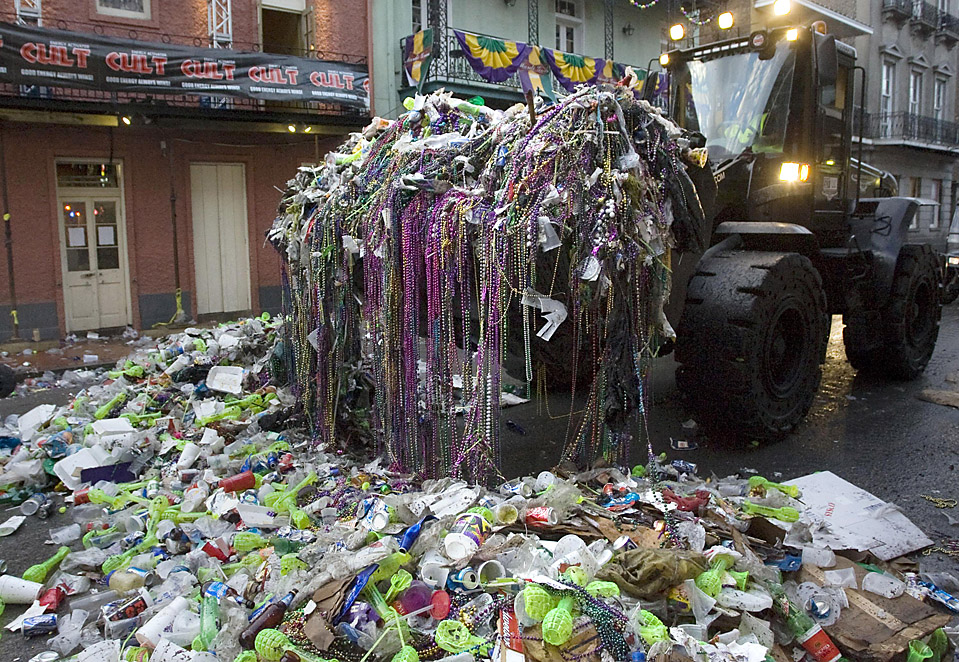
Mardi Gras Trash Pickup (Photo: Wiki Commons)
It is well known that New Orleans has a trash problem. From Mardi Gras beads to to-go cups, all types of trash can be found littered across our streets. Trash cans in the French Quarter are not serviced every evening, leading to overflowing. An even bigger issue than overflowing trash cans is Mardi Gras, estimated to produce almost 1,000 tons of trash with 40 tons of that going directly into our storm drains, leading to flooding. It is essential to create a trash pickup and trash can program like those seen in other countries. In Japan, trash is personal property. There are very few trash cans, leading to people holding their trash until they see one. This is a cultural shift that must take place in New Orleans. Another option is adequate funding for trash collection programs and an increase in trash cans.
New Orleans is built on the Mississippi River. With its flowing nature, the river is a prime candidate for hydro-power. Due to New Orleans’ high chemical, petroleum and natural gas industry, Entergy boasts an emissions rate that is half that of the United States alone. Hydro-electric is the lowest used energy type in New Orleans. Tulane and Xavier universities are exploring the use of hydro-power, yet the problem lies in the public use of the river. Most of the riverside is deemed private property. A push with tax incentives for private property owners to install hydro plants or lease their “land” to companies such as Entergy would help to encourage the community and jumpstart the use of hydro-power in New Orleans.
You probably already know that New Orleans is below sea level, but did you know that every year we lose 25 square miles from the rising sea level? Wetlands act as a natural sponge to protect against sea-level rise, yet New Orleans has lost more than 30 percent of its wetland area to erosion. In 2005 the Agency for the Protection and Restoration of the Coastline included the restoration of wetlands on its agenda. New Orleans needs to start this agenda and restore the wetlands. The two main ways to restore a wetland is by reestablishment and rehabilitation. The Coastal Impact Assistance Program is funding both the rehabilitation and reestablishment of the wetlands using funds derived from offshore oil mining leases. Here is a link where you can see a comparison of the wetland area from the past to the present. https://projects.propublica.org/louisiana/#
New Orleans offers a recycling program, yet it is not a standard for every household. In order to use the city recycling, residents must specifically request a bin. This turns off a lot of residents from recycling, as it is an extra step. Los Angeles County gives homeowners a blue recycling bin along with a green (yard trimmings) and black (regular trash) can. This process requires nothing from the residents. An easier-to-use and more intuitive recycling system would be beneficial to New Orleans. In addition, following Hurricane Katrina, New Orleans took a break from recycling and only restarted the program in 2011. This caused almost overflow at the landfills that could only be fixed with a solid recycling program.
There are thousands of spills from oil mining boats every year. These spills consist of gas, chemicals, and oil. Many spills are incorrectly reported to make them seem not as bad as they truly are or go unrecognized amongst the “web of old wells.” Oil companies must be held responsible for their impact on the Gulf. Healthy Gulf has “volunteer pilots and charter boat captains” who report and photograph spills in order to act as a watchdog. The government should be taking steps in order to prevent spills and prevent underreporting, yet meaningful steps have not been taken. Currently, under the Oil Pollution Act, the responsible party must pay for restoration efforts. Restoration is not the same as keeping our natural resources clean in the first place, and these companies more often than not fail to pay the required amount. The state of Louisiana is missing out on more than $700 million of its restoration budget to companies that are not paying up.
At ViaNolaVie, we don’t just talk about the problems; we also offer solutions, so here are a list of organizations that are doing their part to fight these environmental issues!
https://www.plasticpollutioncoalition.org/
https://www.thegreenproject.org/
http://www.gogreennola.org/coastalrestoration/
Sources and further reading
https://www.nola.com/news/environment/article_ae173ac4-2377-11ea-8f3f-37710b50344c.html
https://www.healthygulf.org/our-story/our-history
https://www.nola.com/news/article_5d07a255-1e2a-5a4c-9aa5-6d2a5af4bef9.html
https://www.nrdc.org/sites/default/files/ClimateWaterFS_NewOrleansLA.pdf
https://www.pri.org/stories/2014-09-23/louisianas-coastline-disappearing-rate-football-field-hour
https://www.audacy.com/wwl/articles/no-discontinues-evening-trash-collection-in-french-quarter
http://lead.tulane.edu/lead_sources.html
https://www.nationalgeographic.com/environment/article/rethink-mardi-gras-without-plastic-beads
https://nextcity.org/daily/entry/how-katrina-killed-recycling-in-new-orleansHydro-power
https://www.entergy-neworleans.com/cleanenergy/
 NOLAbeings Multimedia artist Claire Bangser created NOLAbeings as a portrait-based story project that marries...
NOLAbeings Multimedia artist Claire Bangser created NOLAbeings as a portrait-based story project that marries...  Voodoo in New Orleans: Reviving history: New Orleans fortune telling This article takes a deep dive into the history of Voodoo in New Orleans, its hybridization with Catholicism, and its present-day place in the city's culture. The author visits fortune-tellers in the French Quarter, using their guidance as a tool for introspection rather than a deterministic predictor of the future. Through her experiences in New Orleans, the author feels a mystical connection to both the past and the future.
Voodoo in New Orleans: Reviving history: New Orleans fortune telling This article takes a deep dive into the history of Voodoo in New Orleans, its hybridization with Catholicism, and its present-day place in the city's culture. The author visits fortune-tellers in the French Quarter, using their guidance as a tool for introspection rather than a deterministic predictor of the future. Through her experiences in New Orleans, the author feels a mystical connection to both the past and the future. 
[…] trash cans in the French Quarter are only serviced seven days a week between 4:00am and 8:00am, the trash cans tend to overflow, which means there is more trash than the bin can hold, resulting in trash all over the […]